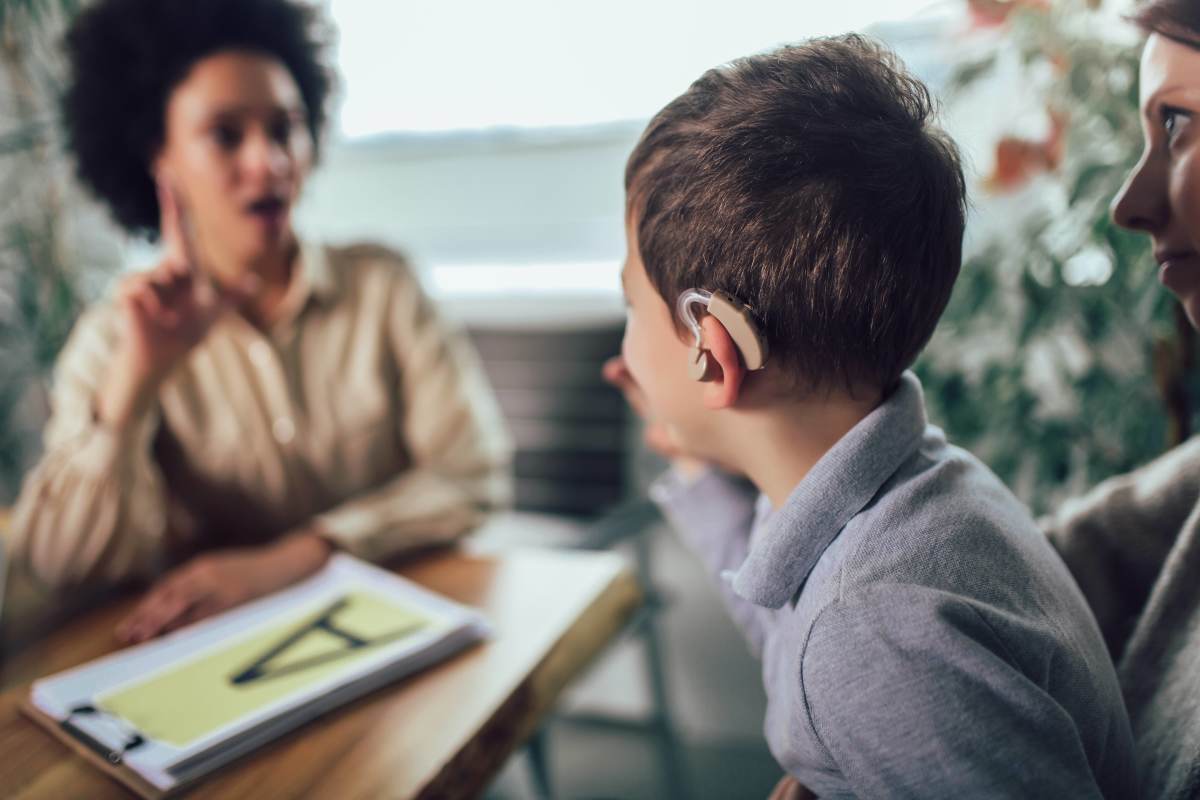
Hard on the hard of hearing

Researchers explore the importance of hearing for mental health, learning acquisition and behavioural development across all ages
Published 23 September 2015
A typical Melbourne café is often a noisy place. You are sitting at the communal table having a coffee meeting while the barista is halfway through the mid-morning rush.
Accompanying the shouts of order numbers is the clatter of plates and glasses, or the joyful sound of children re-enacting the long arduous battle over who gets the teddy and who gets the truck courtesy of the communal toy box.

While all this is happening, your healthy, working auditory system follows messages from the brain that filter the background noise through your ears, locating the sound you need to focus on.
Dr Julia Sarant, from the University of Melbourne’s Department of Audiology and Speech Pathology, has been working with hearing-impaired children and adults for more than two decades and understands all too well the complex partnership between the brain and the ears and what happens at a neurological and auditory level to communicate.
“With two ears,” describes Dr Sarant, “the brain can use the auditory information from each ear to compare and process sound.

“This enables localisation of different sounds, identifying speakers in a group, and filters background noise to enable the listener to understand speech even in noisy environments.”
Conversely, hearing-impaired people who can hear through one ear only find it more difficult to locate the speaker as the brain cannot process the location or loudness of sound without the communication between the two ears.
This can lead to confusion, distraction and frustration and can make social and learning environments difficult to navigate.
The World Health Organization considers participating in society as one of the three key parameters to healthy living and ageing, along with physical health, mental health, and security.

Displayed at the entrance of the Department of Audiology & Speech Pathology is Immanuel Kant’s famous quote ‘blindness separates people from things, deafness separates people from people’
It sets a tenor for all who work there, emphasising the importance of human interaction and social networks for better health.
Hearing impairment can create obstacles in engaging with others for people of all ages.

Health & Medicine
A hearing aid could help your brain
Many deaf children are academically behind their peers and have poorer language development and social skills.
Hearing difficulties in the elderly are related to cognitive decline. Both these symptoms of hearing loss can cause frustration and social isolation leading to a poorer quality of life.
More and more research into neural development, cognition and deafness, has revealed the negative correlation between hearing loss and cognitive skills.
Thirty years ago, the bionic ear was invented by University of Melbourne scientists and engineers.
The Melbourne-based team were leading the world in cochlear implants. Professor Graeme Clark was the first surgeon to insert a cochlear implant in a patient. The cochlear implant is the only treatment for those with severe to profound hearing loss.

Professor Richard Dowell, Head of the Department of Audiology and Speech Pathology who holds the Graeme Clark Chair of Audiology and Speech Science and is the Director for Audiological Sciences at the Victoria Eye and Ear Hospital, is proud of the University of Melbourne’s role in the history of the cochlear implant.
“The University of Melbourne is where it all began for cochlear implants,” he said. “And Melbourne remains a key international centre for research in the field.”
Others in the Department of Audiology and Speech Pathology are researching language skills development in children who have cochlear implants before twelve months of age.

Health & Medicine
Bringing answers to children with a little-known genetic condition
Results of a multi-centre Australian study led by Dr Shani Dettman show cochlear implants for eligible children younger than 12 months can improve listening and spoken language.
With early intervention like this, hearing-impaired children are able to catch up to their hearing peers bringing with it the opportunity to develop social skills at the same rate.
Hearing loss not only affects a child’s neurological development at a young age, it is also associated with cognitive skills decline during the ageing process.
What is less clear is whether hearing loss causes the decline, or if hearing loss is a symptom of cognitive decline.

This area of research is still relatively new as scientists from all disciplines strive to find the cause and treatment of cognitive decline.
A study into hearing loss in ageing populations by Dr Sarant and her team is funded by a new Australian Research Council linkage project to investigate if treating hearing loss delays the onset of cognitive impairment.
The new study on the relationship between restoration of hearing and cognitive abilities in the elderly may have significant impact on improving quality of life in our aging population.

Health & Medicine
COVID-19 face coverings mask the message
“Understanding the pathways that lead to cognitive impairment and identifying factors that affect this process in the elderly is a public health priority,’’ said Dr Sarant.
Hearing loss can cause social isolation, embarrassment, stress and depression as the individual adjusts to how they can participate in their new world.
There is a direct causal relationship between hearing loss and poorer quality of life. With better hearing comes the ability for an individual to stay connected to their family and community, they can maintain their mental health and physical health.
Banner: Pixabay
